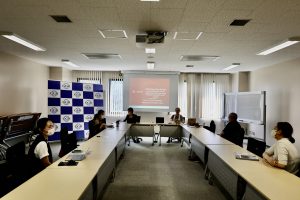On August 24, the Institute for Global Governance Research (GGR) hosted the 7th GGR Brown Bag Lunch seminar titled “Judicial Dialogue in the EU Legal Space: European Arrest Warrant Mechanism as an Example,” with Dr. Yumiko Nakanishi as the lecturer.
A judicial dialogue, which happens between courts through judgement, has contributed to the development of European Union (EU) law, Nakanishi noted. For instance, national courts of EU member states can consult the Justice of EU courts, such as the CJEU (Court of Justice of the European Union), by seeking a preliminary ruling when they have doubts about judicial decisions.
Examining several preliminary rulings on the European Arrest Warrant (EAW) mechanism, Dr. Nakanishi explained how the protection of fundamental rights has also been gradually reckoned with. For instance, a case in the initial stage (CJEU, Case C-399/11, Melloni v Ministerio Fiscal, Judgment of 26 February 2013) shows that the CJEU gave weight to the EAW mechanism, expecting a new mechanism to work effectively. On the other hand, a later case relating to the extradition of the complainant to Italy (GFCC, 2 BvR 2735/14, 15 December 2015) implied that fundamental rights of individuals were also considered and the EAW mechanism was no longer absolute. Lastly, Dr. Nakanishi mentioned that the CJEU sometimes voluntarily takes into consideration the judgement of the ECtHR (European Court of Human Rights), which constitutes indirect judicial dialogue. She concluded that the level of fundamental rights has been guaranteed through these judicial dialogues.
During the Q&A session with about 10 Hitotsubashi professors and students, various questions were raised including the role of national courts in mapping judicial dialogues, the motivations behind the mechanism to be contested by national courts, and the way some EU member states have grown to share common values including fundamental rights.
【Event Report prepared by】
JEONG Minhee (Ph.D. student, Graduate School of Law, Hitotsubashi University)


